Haiti: Ezili Dantò on the election of Michel Martelly
(See also: Martelly, Haiti second great disaster ; US False Benevolence in Haiti ; Beating back the elite’s rabid rage; Seismic shifts and Avatar Haiti)
Question to Ezili Danto of HLLN:
On Tue, 4/5/11, RLwrote:
From: RL
Subject: [ezilidanto] Carnival Musician Michel Martelly Elected President of Haiti
To: erzilidanto@yahoo.com
Date: Tuesday, April 5, 2011, 12:04 PM
Hi Danto, its been a while since i ask question or even reply to any of your comments in here. I notice you spent years fighting for the return of President Aristide now the X-president is back he seems very quiet since his return was there any plan for him to power to power, and how do you feel with the outcome of the presidential result, what do think did the people make the right choice ?
******
Ezili Dantò’s Answer:
To RL:
April 5, 2011 1:19 PM
President Aristide, as far as we know, wishes to work in education and Martelly has yet to take office, so we shall see.
For years we Haitians at HLLN have been struggling to vindicate the bicentennial insult and assault by the former slaveholders on Haiti in 2004 and have insisted that these powers show respect for the value of Haitian life and vote.
Yes, the return has ease the insult but not the assault. Justice has yet to be done and the lives destroyed valued.
Back around 1915, before the first US-long term occupation in Haiti (19-years), a similar deportation was accomplished to stop Dr. Rosalvo Bobo, then head of the Caco rebels and the people’s most likely choice from taking office. Dr. Bobo was deported and never returned from exile.
After the 1957 Duvalier ascendancy, Daniel Fignole, another much loved Haitian leader, was also sent to exile by the Oligarchy and former slave-holding Western countries we face today and never returned, except to die late in his life around 1986.
The return of Aristide, at a fairly young age, is a success not seen for a defenseless country and peoples, ravaged by the elite’s rabid rage.
We hope president Aristide a long and productive life in the field of education and his family well. We hope he continues his work with the poor in health and education.
As for Martelly;
Haiti is a lawless country. Rendered lawless, despite every effort of Haitian lawyers like the HLLN and I, by powerful US and Western forces, by the lawless NGOs and the Haiti Oligarchy. Martelly is lawless and recognizes no establishment. (“ For the first year he would outlaw all strikes and demonstrations.
For what it was, his election, even though only 17% of the electorate were able to vote, but for what it was, he WON that second controversial round squarely. Not enough cared about 70- year old, out-of-touch, Manigat and this vote was the REJECTION of the current political class in office since 2004 and all its “technocrats.” It was a REJECTION vote for Preval and his INITE party and it was a rejection of politics that’s never garnered change for those most in need – basically for most of those who voted for Martelly in Haiti.
In the parliamentary results, you also see very clearly the rejection of the current US/UN parliamentary puppets.
As human rights advocates and lawyers, we are heartened that no one died yesterday after the announcement because the people’s vote was acknowledged. Now, let’s see what the US just bought itself!!!
Martelly is untamed. Perhaps that will work to bring some real schooling, health care, national production and counter the international predators, end the occupation, void the power of Bill Clinton/Paul Farmer’s UN and its un-elected HIRC. That is our best hope for the situation. We wish the people of Haiti to have less dependency, more dignity and to get rid of the UN, who now has what mission? So, it could be a brand new time and change could come, if Martelly pays attention to those who went out and voted for him.
Martelly knows the Haiti Oligarchy, knows their voracious greed, he knows himself in their circle – that gives him an advantage that those other past recent president, who were too schooled-trained tolerant, more structured and diplomatically concerned with self-image perhaps, did not have. Perhaps he can elevate the standard of living of the people, nix the dependency and the NGOs, bring Haitians back at the center of Haiti life and heart. On the other hand, Martelly is pals with the former bloody military and drug dealers like Michel Francois as well as death squad enforcers for the US like FRAPH’s Louis Jodel Chamblain and US-Special forces-trained, Guy Phillip.
This makes him even scarier. As far as we’re concerned at HLLN, Haiti is lawless, US is lawless in Haiti, and Martelly is lawless. Perhaps that’s what’s needed for a change to happen. Decent folks get beaten too easily. Logic hasn’t worked. Decency hasn’t work. Maybe indecent will. For, it may not be that easy to beat untamed Martelly and his crew. So we shall wish for the best for the disenfranchised and just continue our work.
Be well,
Ezili Dantò of HLLN
Se fè ki koupe fè
***********************************************************************
Forwarded by Ezili’s Haitian Lawyers Leadership Network (“HLLN”
***********************************************************************
BACKGROUND
recommended HLLN Links:
The African Trickster by Ezili Dantò
http://bit.ly/ctrTf6
Erasing Haitians, New York Times style
http://bit.ly/gK2AhY
US Embassy on Arrival in Haiti of US troops to Haiti
http://1.usa.gov/hSJ0j7
************BACKGROUND POST*********************
– Carnival Musician Michel Martelly Elected President of Haiti By Ingrid Arnesen | Wall Street Journal, April 4, 2011 | http://on.wsj.com/eqwRvf
– Former musician Michel ”Sweet Micky” wins Haiti presidential runoff By Jacqueline Charles | Miami Herald, April 4, 2011 | http://bit.ly/guNLEN
*********************************************************
Carnival Musician Michel Martelly Elected President of Haiti
By Ingrid Arnesen | Wall Street Journal, April 4, 2011 | http://on.wsj.com/eqwRvf
Michel “Sweet Micky” Martelly, once known as the “President of Kompa” — Haitian carnival music – has been elected President of Haiti in a landslide
Mr. Martelly, a shaven-headed 50-year performer, known for his ribald lyrics and outrageous performances won 67.5% of the vote against Mirlande Manigat, a 70-year former first lady and law professor, who styled herself the “mother” of the country during the election.
The streets of this devastated capital erupted in cheers and honking horns when the results were announced late Monday. But it’s not official yet. Mrs. Manigat may choose to legally challenge the results, which won”t be official-official until they’ve withstood any potential legal challenge. A final winner will be announced later this month.
Before entering politics, Mr. Martelly, who just recently decided to run for president, was known for his outré performances which included cross-dressing on stage, wearing diapers, and dropping his pants to moon the audience. But it was all an act, Mr. Martelly, a father of four, says now.
If history is any guide, being president of Haiti will probably be the toughest role in Mr. Martelly’s life. In modern Haitian history the only president to complete a term was Rene Preval, Mr. Martelly’s predecessor, who twice accomplished the feat. Most others have been deposed by military coups.
During his campaign, Mr. Martelly was supported by his good friend, famed Haitian American hip-hop superstar Wyclef Jean. Mr. Jean had hopes of running for president, but he was disqualified when the electoral commission ruled that he didn”t meet residency requirements.
Mr. Martelly is a virgin when it comes to government. Acknowledging his lack of experience, he has vowed to bring experienced hands on board to run the Haitian ship of state. The preliminary president elect moved to Miami soon after graduating from high school in Port au Prince to pursue his singing career, but returned to Haiti after some false starts.
During the late 1980s and early 1990s, a time when Haiti was marked by military coups, Mr. Martelly ran a nightclub known as The Garage, and palled around with soldiers and police, some of whom have been accused of human rights violations. But Mr. Martelly, who has been criticized for his friendships with members of the military regime, has not been accused of human rights violations.
********************************
http://bit.ly/guNLEN
The Miami Herald
Posted on Mon, Apr. 04, 2011
Former musician Michel ”Sweet Micky” wins Haiti presidential runoff
By Jacqueline Charles
A controversial carnival singer who reinvented himself into a polished political outsider is poised to become Haiti’s next president, according to preliminary election results announced Monday.
Michel “Sweet Micky”” Martelly garnered 67 percent of the vote to 31 percent for longtime opposition leader and former first lady Mirlande Manigat, the Provisional Electoral Council said.
The announcement was greeted with fireworks as fans spontaneously paraded in the streets carrying Martelly’s pink posters and beeping car horns.
Supporters ran in front of elections headquarters singing, “Martelly, the country is for you. Do what you like with it.””
Others sang “Tet Kale,” the bald-headed one, Martelly’s moniker during the campaign.
“The country is sweet, now. Change is coming,”” said Louis Viccues, 42, who works at a dry cleaner. “Nothing is worse than to be living in a country and working, and you cannot eat.””
But while Martelly, 50, won with a 2-1 margin, the results will likely be challenged by Manigat, 70, before they are certified.
After The Miami Herald first reported the results Monday, Manigat’s campaign sent a letter to the justice minister accusing Electoral Council President Gaillot Dorsinvil of influencing the results during a late Sunday night visit to the vote tabulation center.
Even with the challenge, Haiti’s streets remained free of violence that the international community had feared if Martelly had lost. Although there had been a perception for weeks that Martelly had won, his campaign was unsure of the outcome even as advisors put him through governance tutorial courses and met to map out the transition.
The news of Martelly’s win was met with cheers and disbelief by Haitians here and abroad who both embraced and rejected his presidential bid, a well-financed modern campaign complete with foreign consultants and live Twitter and Internet feeds.
For some, the victory is a “rupture”” with the last 25 years that have governed Haiti after the fall of the 29-year Duvalier family dictatorship. Others see more of the same as a political novice leads a nation struggling to dig out from the devastation of the Jan. 12, 2010 earthquake, deal with a deadly cholera epidemic and drastically improve conditions for the country’s 10 million citizens.
“While Martelly is indeed a new leader, the structure of economic power remains the same and the old problems have not disappeared. In fact, the key players of yesterday have not vanished”” said Robert Fatton, a Haiti expert at the University of Virginia who has been following the elections since last year. “Despite his dramatic eruption, Martelly may well be a case of ”old wine in a new bottle,” but time will tell.””
Still, Martelly’s ride from dark horse to the broken national palace is viewed as a vote against outgoing President René Préval, and the country’s traditional political class that have failed to provide economic and social progress over the past 25 years. The lack of progress in improving the population’s condition after the earthquake only intensified the anti-Préval and anti-status quo feeling among voters.
“Voters simply wanted someone who captured the idea of ”change” and Martelly, the persona and the candidate, embodied that mood,”” Fatton said.
But Haiti observers say the fact that most of the country’s 4.3 million voters sat out the elections cannot be discounted. Nor can the fraud that lawyers inside the vote tabulation center found over the past 14 days as they scrutinized more than 25,000 presidential tally sheets.
The preliminary results were transmitted at 8 a.m. Monday to the executive director of the Provisional Electoral Council, whose members triggered momentary panic Sunday evening when they unexpectedly showed up at the vote tabulation center where tally sheets were undergoing a final scrutiny for fraud.
The second round of elections for the presidential and legislative races was better organized than the first round. But like the chaotic Nov. 28 first round, the runoffs were also marred by fraud and irregular voting.
During the March 20 runoff, voters not only stuffed ballots but they included fraudulent voter identification numbers, which were detected by elections workers who included 16 attorneys trained in new criteria set up by the Organization of American States, according to sources.
“He was the beneficiary of the turmoil and all of the attention that the flaw of the first round generated,”” said Eduardo Gamarra, a political analyst on Latin American politics and adviser to Dominican President Leonel Fernandez.. “The irony is all of these reports of fraud are what pushed him into the second round.””
With the lack of control in parliament, a boycott of the elections by several parties and the presence of former presidents including Préval, former dictator Jean-Claude “Baby Doc”” Duvalier and now Jean-Bertrand Aristide, Martelly could find “ruling Haiti even more complicated,”” Gamarra said.
“You have a government with probably not a very long honeymoon that is going to have credibility with other political groups there and the international community may begin to look at with some suspicions because of the origins of its mandate,”” Gamarra said
*********************************
Aristide surprises by staying on Haiti’s sidelines
PORT-AU-PRINCE, Haiti (AP) — Exiled former President Jean-Bertrand Aristide returned in March to a movie star’s welcome, arriving by private jet to a crowd of adoring fans and fevered speculation about what the twice-ousted leader would do back home.
The mystery has only deepened since then.
In a surprise to supporters and opponents alike, Aristide has disappeared from the public eye, vanishing behind the high walls of his compound.
He has made no speeches and granted no interviews. He hasn’t taken a tour of the devastation from last year’s earthquake, at least not that anyone has seen.
Nor has he been spotted at any restaurants as has Jean-Claude “Baby Doc” Duvalier, the ousted former dictator who also made an abrupt return to Haiti this winter.
Aides rebuff questions and security guards at the compound have turned away journalists.
“It’s rare that the president steps out of the house and says hello,” said Jean-Max Maxime, a mason helping to increase the height of the towering concrete walls that surround the house near the Port-au-Prince airport. “He’s always inside.”
Such a low profile is hardly what anyone expected of Aristide, one of the most charismatic leaders in Haitian history. The former priest, who led opposition to the Duvalier regime and became the first democratically elected president, is a polarizing figure: beloved by many of the country’s poor, loathed by the wealthy elite and distrusted by foreign governments, particularly France and the U.S.
Many Haitians expected Aristide would quickly return to politics, doubting the claims by aides that he only wanted to rebuild the university and foundation that withered after he was driven from power in a violent rebellion in 2004. The U.S. warned he could be a disruptive force and he seemed to signal his intentions upon his return by immediately denouncing the exclusion of his party, Lavalas, from the presidential election.
The day of his arrival, thousands of Haitians waited and rallied in the shade of mango trees outside his home. He waved to supporters before vanishing into a cocoon of security from which he has yet to emerge.
“He seems to have disappeared off the radar screen,” said Robert Maguire, a longtime Haiti scholar who teaches at Trinity University in Washington, D.C. “I’m surprised we haven’t heard from him. I don’t know what to make of it.”
Longtime supporters and aides provide few clues. The former president has been invited to attend Saturday’s inauguration of President-elect Michel “Sweet Micky” Martelly, a popular musician who publicly sided with the right-wing elite who ousted Aristide in 2004.
Michelle Karshan, Aristide’s foreign press liaison, said she didn’t know if he would attend the swearing-in ceremony on the grounds of the collapsed National Palace and she declined a request to ask the former president. Maryse Narcisse, a Lavalas leader who frequently spoke for Aristide while he was in exile, now passes on questions to a secretary to the former president, who refers journalists to Karshan.
On most days, a stream of SUVs passes through the gates of the Aristide compound, but it’s unclear with whom he meets. U.S. Ambassador Kenneth Merten hasn’t spoken to the former president, nor has former U.S. President Bill Clinton, the U.N.’s special envoy to Haiti and co-chairman of the reconstruction effort. A spokesman for outgoing President Rene Preval, a former Aristide protege who reportedly became estranged from him in recent years, declined comment.
Aristide’s U.S. lawyer, Ira Kurzban, said the former president is meeting with old friends, deciding his course of action.
“I think he’s trying to listen to people and find out what’s going on in education and in the country in general,” Kurzban said. “I think it would be odd if he came back and started making statements, instead of listening to the people of Haiti about what’s happened the past seven years.”
Aristide made few public statement during his exile in South Africa, though he repeatedly said he wanted to come back to work as an educator through his foundation. After “Baby Doc” showed up in January, Aristide made his desire known again and he was issued a diplomatic passport that enabled his return.
So far, university students and foundation staff say he has not come by the complex, a short drive from the compound.
The school reopened in 2008. Its 200 enrolled students take computer courses and Spanish taught by Cuban instructors. On a recent afternoon, several students in their 20s hung out under a shade tree, seemingly unconcerned by Aristide’s silence.
“He’s home and doing personal things,” said Butheler Elie, 24.
If Aristide, whom many know by his Creole diminutive “Titid,” did emerge from his seclusion, Patrick Elie, a friend and former minister in his government, said he would do so quietly.
“He would have to be very discreet,” Elie said. “The minute people spot him they’re going to scream ‘Titid,’ and you’re going to have a bona fide demonstration.”
******************
Haiti prepares for Saturday’s historic inauguration
The presidential palace, parliament and Cathedral are all broken. But the celebration must go on as Haiti improvises for Saturday’s presidential inauguration.

Stands are under construction as workers prep the grounds of the heavily damaged National Palace for the inauguration of President-Elect Michel Martelly. Workers moved lumber, painted, and constructed stands for the inauguration ceremony on May 14th at the National Palace on Tuesday, May 10, 2011 in Port-au-Prince, Haiti.
CARL JUSTE / MIAMI HERALD STAFF
jcharles@MiamiHerald.com
PORT-AU-PRINCE — On the neatly manicured lawn of the National Palace, Haiti’s collapsing symbol of presidential power, workers are busy building wooden bleachers and draping them in red and blue in time for Saturday’s inauguration of former musician Michel Martelly.
Activity abounds, as well, outside the damaged National Assembly building a few miles away.
The palace, parliament and National Cathedral are all wrecked, destroyed by last year’s massive 7.0 earthquake, which claimed more than 300,000 lives.
“Everything is broken,”” said Daniel Supplice, head of Martelly’s presidential transition team. “But we don’t have a choice. The president has to be inaugurated either way. It has to be done. We have to see how it is done.””
The inauguration ceremony begins early Saturday with the arrival of Martelly, parliamentarians and President René Préval at a plaza near the parliament building. It will end with festivities throughout all 10 of Haiti’s geographical political departments, said Fritz Jean-Louis, Martelly’s chief celebration planner.
The ceremony will be the high point of events to mark the rise to the presidency of the konpa star better known as “Sweet Micky”” after an election fraught with controversy, protests and foreign diplomatic intervention.
A group of Haitian-Americans held a $500-per-person VIP reception and dinner fundraising benefit Thursday night at the upscale Karibe Hotel in Petionville. On Saturday, there is a $500-a-plate “selection admission only”” inaugural ball by the Florida Martelly Group at the Ritz Kinam in Petionville. It will feature a five-course dinner by former Bravo Top Chef contestant Ron Duprat.
At 9 a.m. Friday, all of the nation’s Catholic Churches are scheduled to hold a Mass in honor of Martelly. In the afternoon, there will be Protestant services followed by a prayer revival and concert on the Champ de Mars, the downtown public square-turned homeless encampments for tens of thousands of quake victims.
Three sets of invitations have gone out — some are still going out (French President Nicolas Sarkozy received his Tuesday) — for three distinct events. Total cost: $4.5 million, according to government officials.
The swearing-in outside parliament’s new building will immediately be followed by a ceremony on the grounds of the National Palace, which has been transformed into a showcase with tents as the backdrop. About 2,500 people are expected. A reception that would have taken place inside the palatial white structure was moved to the Karibe.
Even the Roman Catholic Mass, which would have taken place in the Cathedral, has been moved to the palace grounds.
“We will not have a long cultural program,”” Jean-Louis said.
Not part of the program is the former self-appointed president of konpa’s famous carnival pledge to dance naked on top of the National Palace once he becomes president.
“Maybe once the country is back on track and the people have found some relief, he may sing a song,”” Jean-Louis said, laughing.
About 150 foreign dignitaries have confirmed for the inauguration, and they begin arriving on Friday. The list includes just three sitting presidents, representing Honduras, the Dominican Republic and Suriname. The tiny South American nation has the largest delegation with 17.
The White House announced this week that the U.S. delegation will be led by former President Bill Clinton, co-chair of the Interim Haiti Reconstruction Commission; and include Kenneth Merten, U.S. ambassador to Haiti, and Thomas Adams, Haiti special coordinator in the State Department.
France will be represented by Foreign Minister Alain Juppé, Haiti’s French Ambassador, Didier Le Bret, said. His entourage of 10 will include a member of parliament and two ambassadors, including Le Bret.
The English-speaking Caribbean community will be represented by Prime Ministers Hubert Ingraham of the Bahamas, Tillman Thomas of Grenada and Bruce Golding of Jamaica.
No celebration in Haiti is without a bit of controversy, and Martelly, 50, isn”t spared. His invitation to all of Haiti’s eight living presidents, including former President-for-Life Jean-Claude “Baby Doc”” Duvalier, has stirred emotions.
Calling the invitation “scandalous,”” Haiti’s National Human Rights Defense Network has reminded Martelly that Duvalier is currently charged with numerous crimes committed during his 15-year reign and is under house arrest. He has refused to “answer the summons of the magistrate on the grounds that his health is precarious,”” the group said. Duvalier has refuted that he’s under house arrest.
The invitation, it said, “is a total disregard to the tens of thousands of victims”” and raises the question on whether Martelly “will start his five-year term under the sign of forgetfulness and impunity.”” It added that the image of Duvalier sitting with the other former presidents is “disturbing.””
But Jean-Louis said Martelly is striving for an image of “reconciliation”” in a country with a turbulent history.
“The image will be pretty for the country if they are all there,”” he said. “There is a time that arrives for us to say — ”Here is how we are going to advance.” ””
But it’s unlikely that Martelly will get all of Haiti’s presidents sitting along the same row. Former President Leslie Manigat, whose wife lost to Martelly in the March runoff, is on a cruise. Henri Namphy is in the Dominican Republic, and unlike Duvalier, Jean-Bertrand Aristide, who also recently returned from exile, has been keeping a low profile. Also uncertain is whether Préval will stick around after passing the presidential sash, the symbol of power.
Add a comment:
Powered by Facebook Comments

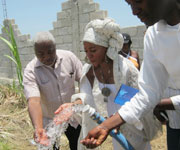

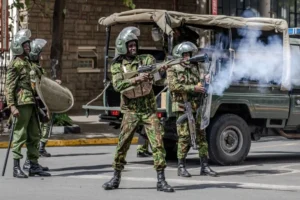
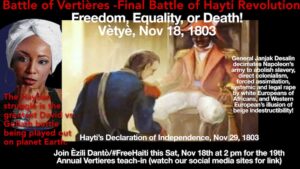
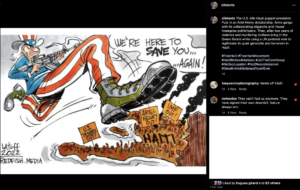
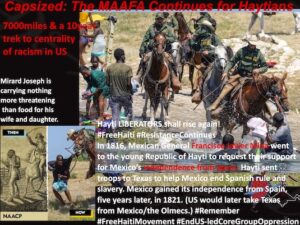

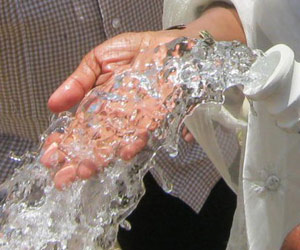
Until we the 250 million Afrodescendants in the western hemisphere establish our Human Rights, secure Reparations and experience Ethnogenesis, we will remain completely victimized and pulverized.
It would seem that you, and others, are resigned. Resigned to more years of oppression, suppression, and killing of the downtrodden poor. In a way, I am quite angry at Aristide. Perhaps I don’t know the whole background behind it all but I do think that Aristide should have come out in support of Ceant in the November 28th elections.
My greatest criticism of Aristide is that he failed to make a coherent party of Fanmi Lavalas. A grassroots movement can only get you so far, especially if it is dependent on a single leader. A strong, well-organized party is the only way to blaze the trail towards a better future for the poor majority. Perhaps Martelly will overplay his hand and piss off the masses but I hope by then Lavalas can mature and emerge as a strong party organization with a coherent plan. They should take lessons from the ANC.
….. WE PEOPLE WHO CONCERN …..
I think we need to form what I will call a right before he takes office and before he starts any crasyness thing, to protect our values, our presidency, and our principles.. The media, intellectual, scholars .. every Haitian who concern to teach him the right way … he can learn it and do it well … I think that is the rationnal path we should take …We people who concern..
@Jean Paul
Seven (7) years ago, Ezili Dantò and the HLLNetwork took a public stand, following the Law of Desalin, for Haiti to be an independent Black nation, not colony.
Seven (7)years ago, Ezili Dantò/HLLN took a stand against re-colonization of Haiti through occupation and a return to dictatorship under the guise of “elections”. We still stand for justice and Haiti self-determination and self-defense and sovereignty.
We still stand and will not reconcile with injustice, re-enslavement and the return of the Duvalierist empire vampires. Seven (7) years ago, in “Dialogue Between two Haitians” ( http://bit.ly/ht0JJW ), I wrote:
“With our souls and bare hands, wherever we are, Haitians will not let the old guard with the U.S. and Euros return us back to ground zero. It appears impossible to take on Goliath, but we shall step out and let our vision make a way. So, if you are not ready for the war that’s here EKL28, back off. But Haitians have got work to beâ¦â
No resignation here. Also, there’s no use railing against this newest disenfranchisement with the Martelly rigged (s)election, when we indigenous Haitians know that power in Haiti, is not solely in the institutionalized Western hierarchical system that the West defines at will and defends arbitrarily. Just as the informal economy invisible to the West in Haiti is discounted, so is Haiti’s indigenous, non-institutionalized, governance structure. That doesn’t mean it doesn’t exist.
After the earthquake (and, for that matter, since its beginning as a nation), there has always been an indigenous, community (lakou) form of Haiti governance at work outside of the almost non-existent Haiti formal government, a formal neocolonial governance that hardly ever gives priority to the needs of the masses. That Haiti governance has nothing to do with formal power but its indigenous power. It is Vodouist, old, African and the reason why, without formal governance, formal police everywhere, thereâs no consistent full-blown breakdown of social order despite the misery imposed on Haiti. It is you and I and we more than10million descendants of Desalin and our connection to source, flow, discipline and connection and relationship to a humane and universal ideological support system and now, to friends worldwide. It is “people to people.” It is the Ezili Network and a hundred thousand others invisible to Officialdom’s NGOs and Phd experts and post-Breton Woods âleadership and governance theorists.â It is human relationships, human POSSIBILITIES, continually moving toward wholeness; HUMAN-NESS that is undeterred by the global corporatocracy’s insanity and inhumanity.
This other power base in Haiti is animated beyond the formal presidency and NGO republic and international community that always gets press and constantly articulates the colonial narrative. Itâs âeffective, accountable and legitimate relational governance” in Haiti, but it has NEVER been acknowledged because of the colonial narrative that denies Haiti has its own internal authority, separate and apart, from the predatory state, the global corporatocracy, the NGO false benevolence and Haiti Oligarchy.
But Ibo granmoun lakay Ibo – Haitians are their own authority. Ginen poze. It’s non-institutionalized in the Western sense and thus invisible to PHD governance theorists. Still “viv,” âlakouâ and “konbit” exist. (See, Ibo Granmoun : The Roots of Haitian Democracy: http://bit.ly/hF9Uua and “Vodun Konbit and Vodun Lakou” – http://bit.ly/a6AWH8 )
@Jean Paul, may I humbly reiterate, seven year on, in this moment still, we Haitians, we paradigm shifters, have got work to be. Thank you for your comment. Be well,
Ezili Dantò of HLLN
For some information on Haiti’s indigenous leadership structure that is invisible to the neocolonial mindset, the indigenous Haiti structure that authorizes ITSELF and gets power from source; for info on Haitiâs fundamental non-hierarchical, âinformalâ leadership or relationship governance that are self-managed Haiti teams that form, operate, dissolve and then re-form per the reality and relationships on the ground and to serve LIFE, not profit, go to Ezili Dantòâs Network on: “Vodun Konbit and Vodun Lakou” – http://bit.ly/a6AWH8 ; The Haitian union forged at Bwa Kayiman -has never wavered http://bit.ly/9uzMXS and Haitian Epistemology http://bit.ly/fBCE8B.
Thank you so very much for clarifying what you meant.
I suppose that we have to define further how to strengthen this lakou. It is obvious that nearly 80% of the people did not turn out for the sham (s)election and so there IS passive resistance. Besides, there is already the struggle to simply get fresh drinking water and food, a major task for millions, not to mention trying to stay alive amid the cholera-tainted filth and squalor of the semi-permanent temporary camps. Now, as before, the Haitian people are often being assaulted by NGOs with conditional handouts, i.e. they are being peddled Protestant Christian White man’s religion. While there is still resistance to this, some people are succumbing to this not so new barbarism and forsaking Vodun. Is there anything being done to counter this assault on the essence of Haiti? (handouts, “countermissionary effort”) It seems that it is an unequal fight between the 700 Club millions and the penury of the Vodun practioners. Also, apart from the struggle of daily survival, both physical and spiritual, there is also the assault on the Kreyòl language. There is propaganda bombarding the people saying the Kreyòl is bad French, it is just peasant talk, and that they should abandon it in favour of French, English, or even Spanish. I know that Kreyòl is alive and well for now but it needs help in the area of polishing it, equipping it with dictionaries, grammars, and vocabulary. Could you tell us what is being done in this area, if you can? I believe there are many fronts in the fight against colonialism and I have mentioned these two factors (strengthening Vodun and Kreyòl) now because no one else is talking about them. Living outside of Haiti makes it hard for many of us to know certain aspects of what is going in everything down there. Mèsi anpil.
Please look at our site, as we have published Greg Grandin’s piece with links to Ezili’s article and other blogs about Haiti.